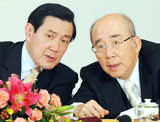Chinese Nationalist Party (KMT) Chairman Wu Poh-hsiung (吳伯雄) yesterday declined to confirm if he intends to seek re-election as party chairman and said those vying for the chairmanship would be announced in June.
“Everything will become clear on June 15 when hopefuls are required collect a registration form. I will contest the election if I claim a form on that day and I will not if I don’t claim a form,” Wu said yesterday at KMT headquarters.
When asked about speculation that President Ma Ying-jeou (馬英九) could take over as party chairman, Wu reiterated that the candidates would be known on June 15.

PHOTO: WANG YI-HSIUNG, TAIPEI TIMES
The election for KMT chairman is scheduled to take place in July.
The Presidential Office has rebutted media speculation that Ma will double as President and KMT chairman in order to take control of party affairs.
KMT Secretary-General Wu Den-yi (吳敦義) yesterday also said Ma and Wu Poh-hsiung would decide by June whether they will run in the election for party chairman.
A poll conducted by Chinese-language newspaper the China Times showed that 39 percent of respondents said the KMT were not implementing Ma’s policies. However, 47 percent said they were opposed to Ma becoming KMT chairman. Only 27 percent said they supported Ma taking up the position.
When asked about who they would support in the KMT chairman election, 29 percent said Taichung Mayor Jason Hu (胡志強).
Asked whether they were satisfied with Ma’s performance, 44 percent of the respondents said yes, while 40 percent said they were satisfied with Wu Poh-hsiung’s performance.
Wu Poh-hsiung said Hu’s high support rate showed that the party was not lacking in talent.
At a separate setting yesterday, KMT Legislator Chiu Yi (邱毅) said he was against Ma acting as president and party chairman, saying it would be a setback to democracy.
He said that the China Times survey showed that “the ass kissers close to President Ma can stop [pushing the idea] now that Ma knows how loyal you are.”
ADDITIONAL REPORTING BY FLORA WANG

The first global hotel Keys Selection by the Michelin Guide includes four hotels in Taiwan, Michelin announced yesterday. All four received the “Michelin One Key,” indicating guests are to experience a “very special stay” at any of the locations as the establishments are “a true gem with personality. Service always goes the extra mile, and the hotel provides much more than others in its price range.” Of the four hotels, three are located in Taipei and one in Taichung. In Taipei, the One Key accolades were awarded to the Capella Taipei, Kimpton Da An Taipei and Mandarin Oriental Taipei. Capella Taipei was described by

EVA Airways today confirmed the death of a flight attendant on Saturday upon their return to Taiwan and said an internal investigation has been launched, as criticism mounted over a social media post accusing the airline of failing to offer sufficient employee protections. According to the post, the flight attendant complained of feeling sick on board a flight, but was unable to take sick leave or access medical care. The crew member allegedly did not receive assistance from the chief purser, who failed to heed their requests for medical attention or call an ambulance once the flight landed, the post said. As sick

Minister of Economic Affairs Kung Ming-hsin (龔明鑫) yesterday said that private-sector refiners are willing to stop buying Russian naphtha should the EU ask them to, after a group of non-governmental organizations, including the Centre for Research on Energy and Clean Air (CREA), criticized the nation’s continued business with the country. While Taiwan joined the US and its Western allies in putting broad sanctions on Russia after it invaded Ukraine in 2022, it did not explicitly ban imports of naphtha, a major hard-currency earner for Russia. While state-owned firms stopped importing Russian oil in 2023, there is no restriction on private companies to

INDUSTRY: Beijing’s latest export measures go beyond targeting the US and would likely affect any country that uses Chinese rare earths or related tech, an academic said Taiwanese industries could face significant disruption from China’s newly tightened export controls on rare earth elements, as much of Taiwan’s supply indirectly depends on Chinese materials processed in Japan, a local expert said yesterday. Kristy Hsu (徐遵慈), director of the Taiwan ASEAN Studies Center at the Chung-Hua Institution for Economic Research, said that China’s latest export measures go far beyond targeting the US and would likely affect any country that uses Chinese rare earths or related technologies. With Japan and Southeast Asian countries among those expected to be hit, Taiwan could feel the impact through its reliance on Japanese-made semi-finished products and